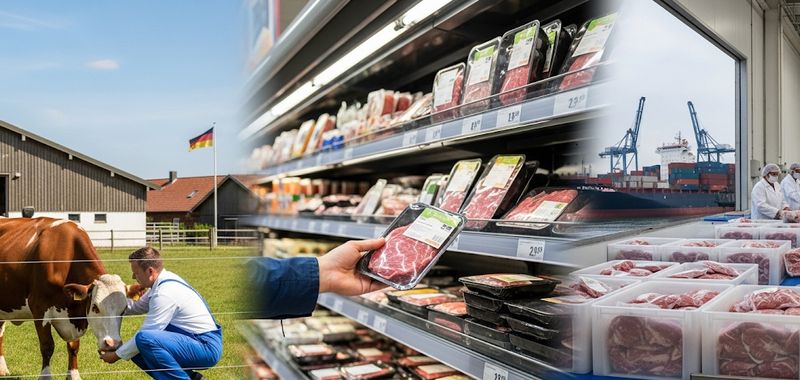
Market Pulse: German BTV-3 Curbs, UK Organic Sales Dip, and Poland's Export Push
Germany imposes new bluetongue movement restrictions, UK organic meat sales fall amid cost-of-living pressures, and Poland launches a new fund to boost exports.
From new animal health restrictions in Germany and a consumer shift away from organic meat in the UK to a major export-focused investment in Poland, this week’s developments are being shaped by disease control, economic pressures, and strategic government action.
Animal Health: Germany Imposes New Bluetongue (BTV-3) Movement Curbs
What happened: Germany’s Federal Ministry of Food and Agriculture (BMEL) has announced strict new animal movement restrictions in several northern and western regions following the detection of new cases of Bluetongue virus serotype 3 (BTV-3). The new rules severely limit the transport of cattle and sheep out of the designated restriction zones, with exceptions only for animals proven to be vaccinated or that have tested negative.
Why it matters: This is a significant logistical and economic challenge for one of the EU’s largest beef and dairy producers. The restrictions will disrupt the normal flow of livestock to slaughterhouses and finishing farms, potentially creating regional supply bottlenecks and price volatility. It underscores the ongoing threat that BTV-3 poses to the European ruminant sector.
Implications & suggested actions:
German Farmers: If you are inside the new restriction zones, this will immediately impact your ability to move animals. Contact your veterinarian and local authorities to understand the exact testing and vaccination requirements needed to sell your livestock.
Processors & Abattoirs: Expect a disruption to your normal intake of cattle and sheep from the affected regions. You will need to work closely with your suppliers to manage the logistics of sourcing from within or outside the restricted zones.
Wholesalers & Importers (EU-wide): Be aware of potential short-term supply disruptions for German beef and lamb. This could create opportunities for suppliers in other regions, like Poland and France, to fill any gaps in the market.
UK Market: Organic Meat Sales Fall as Shoppers Prioritise Price
What happened: The latest retail data from the Soil Association shows that sales volumes of organic meat in the UK have fallen by 8% over the past quarter. The report directly links the decline to the ongoing cost-of-living crisis, with consumers switching to cheaper, conventionally-farmed meat to manage their grocery bills. The drop was most pronounced for more expensive proteins like organic beef and lamb.
Why it matters: This is a clear indicator that for a significant portion of consumers, price is now trumping concerns about welfare or sustainability. It presents a major challenge for the organic sector, which relies on a price premium to cover its higher costs of production. The trend reinforces the data we reported on September 1st, showing a wider "trade-down" effect to cheaper cuts like mince.
Implications & suggested actions:
Organic Farmers & Processors: The market for your premium product is shrinking in the short term. It is crucial to work with retailers on targeted promotions or developing more affordable organic products (e.g., mince, sausages) to keep consumers engaged with the category.
Retailers: The data shows a clear need to manage the price perception of your organic range. Consider introducing smaller pack sizes or using organic meat as a "halo" ingredient in ready meals to provide a more accessible entry point for budget-conscious shoppers.
Conventional Producers: The shift away from organics is temporarily increasing the market share for conventionally-produced meat. However, this is a price-driven trend; maintaining a focus on your own farm's welfare and environmental credentials remains the best long-term strategy.
Eastern Europe: Poland Launches Fund to Boost Meat Exports
What happened: The Polish government has launched a new PLN 200 million (approx. €47 million) fund to support the promotion and development of its meat exports to non-EU markets. The programme will provide co-financing for processors to attend international trade fairs, gain the necessary veterinary certifications, and conduct marketing campaigns in new target regions, particularly Southeast Asia and the Middle East.
Why it matters: This is a significant, state-backed investment to build on Poland's recent success and establish "Made in Poland" as a global meat brand. This new fund provides the financial firepower to accelerate the push to diversify beyond the EU.
Implications & suggested actions:
Polish Processors & Exporters: This is a direct opportunity to get financial support for your export activities. Prioritise applications that align with the government's target markets in Asia and the Middle East to maximise your chances of success.
EU Competitors: The playing field is not level. This state-backed support will increase the competitive pressure from Polish exporters in valuable third-country markets. This is a key issue to raise with your own national trade bodies and government representatives.
Trade Fair Organisers & Marketing Agencies: This fund will unlock a new wave of Polish participation in major international food shows. Proactively engage with Polish industry associations to showcase how your events and services can help their members achieve their new export goals.
Sources
Germany announces new BTV-3 restriction zones - BMEL (Federal Ministry of Food and Agriculture) (https://www.bmel.de/DE/themen/tiere/tiergesundheit/tierseuchen/btv-3-faelle-in-deutschland.html)
Organic meat sales decline amid cost-of-living pressures - Soil Association Organic Market Report Q2 2025 (https://www.soilassociation.org/certification/market-research-and-data/organic-market-report-2025/)
Poland launches new fund to support meat exports - Polish Ministry of Agriculture and Rural Development (https://www.gov.pl/web/rolnictwo/nowy-fundusz-promocji-miesa)
